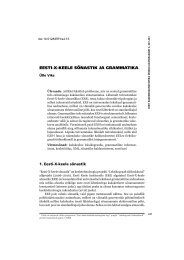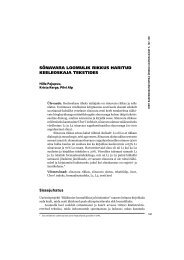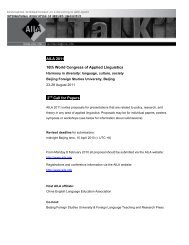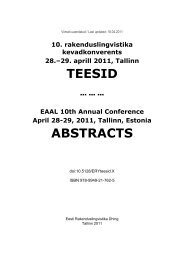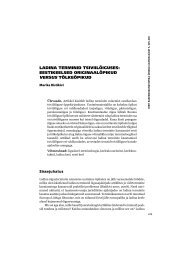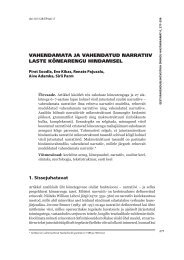ACQUISITION OF CASE IN LITHUANIAN AS L2: ERROR ANALYSIS
ACQUISITION OF CASE IN LITHUANIAN AS L2: ERROR ANALYSIS
ACQUISITION OF CASE IN LITHUANIAN AS L2: ERROR ANALYSIS
You also want an ePaper? Increase the reach of your titles
YUMPU automatically turns print PDFs into web optimized ePapers that Google loves.
In Example (16), similarly to Example (10), the student does not know the rules for<br />
the time expression yet. Nevertheless, the student’s progress is obvious, that is, the<br />
Korean student uses the plural genitive that orthographically reminds one of the<br />
singular accusative case instead of the nominative that was used in Example (10).<br />
3.3. Dative case errors<br />
As the semantics of the dative is not as clear as that of the nominative or genitive,<br />
it takes more time to learn and acquire the subtleties of its use. Consider Example<br />
(17):<br />
(17) Po to jis susitiko berniukui: SG:M:DAT [= berniuk#: SG:ACC] su ž#siu.<br />
(German)<br />
‘Then he met a boy with a goose’<br />
The use of the dative case in Example (17) is most probably due to the inuence of<br />
the student’s native tongue. Depending on the context, the verb treffen (‘to meet’)<br />
in the German language, requires either the accusative case or the dative with the<br />
preposition mit (‘with’).<br />
One of the reasons why the dative is used erroneously might be the polysemy<br />
of certain verbs. For example,<br />
(18) Kai jam: SG:M:DAT [= jis: SG:NOM] pasirod!, aš buvau labai laiminga<br />
ir džiaugiausi. (Japanese)<br />
‘When he showed up, I was very happy and glad’<br />
The verb pasirodyti has more than one meaning: ‘to come’, ‘to turn out’, etc. Example<br />
(18) demonstrates that the student knows the government of this verb in its ‘to<br />
seem, to look like’ meaning and therefore, chooses the dative case instead of the<br />
nominative. Here the drawbacks of dictionaries should also be mentioned. It might<br />
be assumed that in this case the student consulted a dictionary where polysemous<br />
verbs are not illustrated with clear examples which would make it easier to detect<br />
the grammatical information.<br />
Subordinate clauses are another category that is difcult for students to master.<br />
Even advanced level students who are already able to use the dative case correctly<br />
make errors when it comes to complex sentences. For instance,<br />
(19) Mano baisiausias sapnas buvo apie berniuk#, kuriam: SG:M:DAT<br />
[= kuris: SG:NOM] man patiko vaikyst!je. (Japanese)<br />
‘My worst dream was about a boy whom I liked in the childhood’<br />
Example (19) shows that the student knows the government of the verb patikti<br />
(‘to like’), but applies it incorrectly. In this example the error occurs due to the<br />
complexity of the sentence. Lithuanian complex sentences are learnt rather late by<br />
students (they start forming them only in the upper intermediate level). Therefore,<br />
while creating longer sentences, students have to process more information and<br />
thus make errors.<br />
54



